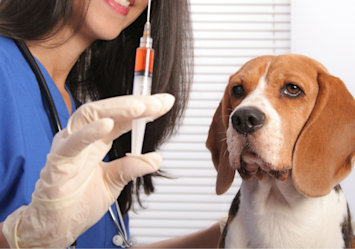
Rabies is a serious viral disease that poses a threat not only to dogs but also to humans. Ensuring your dog is vaccinated against rabies is crucial for their health and public safety. In fact, rabies vaccination is legally required in most states, making it a non-negotiable part of responsible pet ownership. Beyond just compliance with the law, rabies vaccination plays a critical role in preventing the spread of this deadly disease. However, the cost of the rabies shot is a concern for many pet owners.
The Rabies Virus
Rabies is a fatal viral disease that affects the central nervous system of mammals, including dogs. The virus is primarily transmitted through bites from infected animals, making it highly contagious. Once symptoms appear, rabies is almost always fatal, which is why prevention through vaccination is so important. Symptoms of rabies in dogs can include fever, excessive salivation, difficulty swallowing paralysis, and aggressive behavior. Unfortunately, there is no cure for rabies once clinical signs are present, which underscores the importance of regular vaccination.
Factors Affecting Rabies Vaccine Cost
When considering how much a rabies vaccine costs, it’s important to understand that puppy shots cost can vary depending on several factors. On average, the rabies vaccine for dogs costs between $40 and $75. Additionally, since the rabies vaccine is required to be given by a licensed veterinarian, many veterinarians may charge for the wellness visit cost as well at the time of the vaccine. However, this price can fluctuate based on a few key elements:
Annual versus triennial booster: The first rabies vaccine a dog receives as a puppy is typically only valid for one year. After that, your dog can receive triennial boosters, or a booster every three years.
Location of vaccination services: The cost of a rabies shot can vary depending on where you live and where you choose to get the vaccine. Veterinary clinics in urban areas may charge more than those in rural settings. Additionally, low-cost vaccination clinics and animal shelters often provide rabies vaccines at a reduced price, making it a more affordable option for pet owners on a budget.
While rabies is a legally required vaccine in most states, it’s important to maintain your dog’s rabies vaccine for their own health.
Rabies Vaccination Schedule
Understanding the rabies vaccination schedule is essential for ensuring your dog is adequately protected. Typically, puppies receive their first rabies shot at around 12 to 16 weeks of age, and this vaccine is valid for one year. While the laws vary by state, most states require a rabies only every three years after the initial vaccine.
Consulting with your veterinarian is crucial for determining the appropriate vaccination schedule for your dog. Factors such as your dog’s lifestyle, health status, the specific rabies vaccine used, and state laws can all influence the frequency of rabies vaccinations. Your vet can provide personalized recommendations to ensure your dog remains protected against this virus.
Pet Insurance Coverage and the Rabies Vaccination
Pet insurance typically doesn’t cover vaccinations, but optional, non-insurance pet wellness plans can help you manage the cost of rabies vaccinations. With pet wellness plans, you can select an annual benefit and access those funds immediately. Wellness rewards can be used on a variety of annual and preventative care, making it easier—and more affordable—to keep up with your pet’s yearly exams and vaccination schedule.
Of course, pet insurance for dogs goes way beyond just wellness plans. A good pet insurance plan can help protect you from all kinds of accidents and illnesses your pet might run in to out in the wild world! Pet insurance acts as a safety net for your furry friend, allowing you to get them the best care possible for any accidents or illnesses, without worrying about the cost.
Potential Side Effects of Rabies Vaccine
While the rabies vaccine is generally safe, it’s important to be aware of potential side effects. Most dogs experience only mild side effects, such as soreness at the injection site, slight lethargy, or a mild fever. These symptoms typically resolve within a day or two.
In rare cases, dogs may experience allergic reactions to the rabies vaccine. Signs of an allergic reaction can include swelling, vomiting, difficulty breathing, or hives. If you notice any of these symptoms after your dog receives a rabies shot, contact your veterinarian immediately. Despite these risks, the benefits of vaccinating your dog against rabies far outweigh the potential side effects, making it a critical part of their overall health and wellbeing.
Additional Dog Vaccinations
In addition to the rabies vaccine, your dog will likely need other vaccinations to stay healthy. Core vaccines, such as DHPP (which covers distemper, hepatitis, parvovirus, and parainfluenza) are essential for protecting your dog from other common diseases. Non-core vaccines, like those for leptospirosis, Bordetella (kennel cough), Lyme disease, and canine influence, may also be recommended based on your dog’s lifestyle and environment.
The cost of these additional vaccinations can add up, making it even more important to consider pet wellness plans that can help you budget for the costs of these essential vaccines, ensuring your dog receives comprehensive protection against various diseases. You’ll be able to rest assured that you can provide for your dog’s medical care without having to worry about finances.
Get the Rabies Shot for Dogs, it’s Worth it
Rabies vaccination is not only a legal requirement in most states but also a vital step in safeguarding your dog’s health and public safety. Understanding the rabies shot cost and the factors that influence it can help you plan for this important expense. When it comes to keeping your dog happy and healthy, it’s important to consult with your veterinarian to create a personalized vaccination plan that meets your dog’s specific needs and keeps them on the path to a long, healthy life.